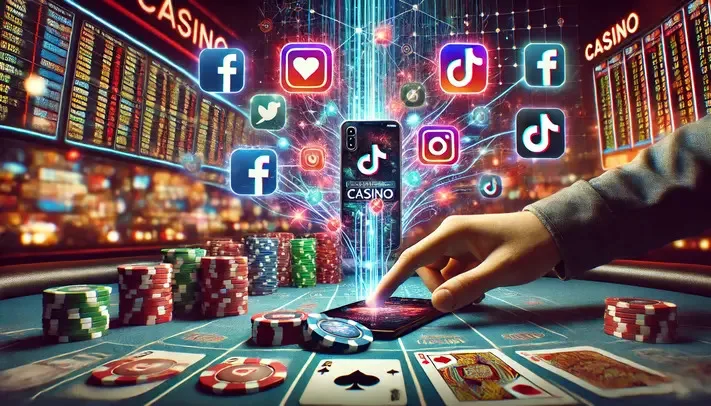Psychology of Casino Player Behaviour in the Era of Social Media

The rise of social media has significantly transformed the gambling landscape, altering player behaviours and decision-making processes. Platforms like Facebook, Instagram, and Twitter have not only made casino gaming more accessible but have also introduced new psychological triggers that influence user engagement. As the digital sphere expands, understanding these psychological aspects becomes crucial for both players and operators in the industry.
Modern casino gaming is no longer confined to physical establishments. Online platforms like Pasino casino online provide players with interactive and immersive experiences that are deeply intertwined with social media engagement. The integration of these digital spaces raises essential questions about player psychology, decision-making, and the long-term effects of continuous online interaction.
Social Media and Gambling: A New Era of Interaction
Social media has redefined the way players interact with gambling platforms. The traditional model of casino gaming, which relied on physical presence and word-of-mouth promotion, has evolved into a digital-first approach. Players can now share their gaming experiences in real time, influencing others through wins, losses, and strategic insights. This level of connectivity fosters a sense of community among casino enthusiasts, making gambling more interactive than ever before.
The psychological impact of social validation plays a crucial role in this interaction. Seeing others win on platforms like Instagram or TikTok can trigger a sense of “fear of missing out” (FOMO), pushing users to participate more frequently. The instant gratification provided by online casinos, such as Pasino casino online, combined with social endorsement, reinforces player engagement and risk-taking behaviour.
Additionally, the gamification of gambling through social media elements—leaderboards, challenges, and live-streamed competitions—further deepens user involvement. These mechanisms leverage social influence to sustain engagement, making gambling a more habitual activity rather than an occasional form of entertainment.
Psychological Triggers and Engagement Mechanisms
Casino gaming, particularly in an online setting, is driven by various psychological triggers that keep players engaged. One of the most powerful is variable reward reinforcement, where wins and losses occur unpredictably. This mechanism, commonly seen in social media algorithms, keeps users returning for more, mirroring the dopamine-driven feedback loops found in platforms like Twitter and Facebook.
Another key trigger is the illusion of control. Online casinos often provide interactive features such as strategy-based games or betting adjustments that give players a sense of influence over outcomes. While this enhances engagement, it also contributes to cognitive biases where players overestimate their ability to predict results, leading to prolonged gaming sessions.
The integration of push notifications and personalised promotions further exploits behavioural psychology. Limited-time offers and exclusive bonuses create urgency, leveraging the psychological principle of scarcity. This, in turn, encourages impulsive decision-making, particularly among players who are already immersed in a social media-driven gambling culture.

How Social Pressure Affects Gambling Decisions
The role of social pressure in gambling behaviour has grown exponentially with the rise of digital interactions. Social media allows for real-time peer influence, where players feel the need to match the experiences of their online counterparts. When high-stakes wins or strategic plays are shared widely, they can create unrealistic expectations and influence betting behaviour.
Group dynamics also play a significant role in shaping gambling decisions. Online forums, live-streaming sessions, and casino communities contribute to a collective gambling mindset. This “herd mentality” leads players to follow trends rather than making independent, rational choices. As a result, risk-taking increases, with individuals making decisions based on perceived social norms rather than personal financial limits.
Moreover, the integration of influencers and brand ambassadors in the casino industry further reinforces social influence. Players who see trusted figures endorsing platforms like casino Pasino are more likely to engage, often without critically assessing their own gaming habits. This creates an environment where social validation dictates behaviour, sometimes at the expense of responsible gambling practices.
Responsible Gambling and Self-Control in the Digital Age
As digital gambling continues to grow, the importance of responsible gaming practices cannot be overstated. The ease of access to online casinos, coupled with social media influence, increases the risk of problematic gambling behaviours. Understanding self-regulation strategies is essential for maintaining a healthy balance between entertainment and excessive engagement. One effective approach is setting strict gambling limits. Many platforms, including Pasino casino online, offer self-exclusion tools, deposit limits, and playtime tracking features to encourage responsible gaming. However, personal discipline remains a crucial factor. Players must develop awareness of their gaming habits and recognise when social influence is pushing them towards irrational decision-making. Education and awareness campaigns also play a vital role in promoting responsible gambling. Social media can be used as a force for good by spreading information about the psychological aspects of gambling, the risks of addiction, and the importance of self-control. By leveraging these digital tools positively, both players and operators can contribute to a more sustainable gambling environment.
